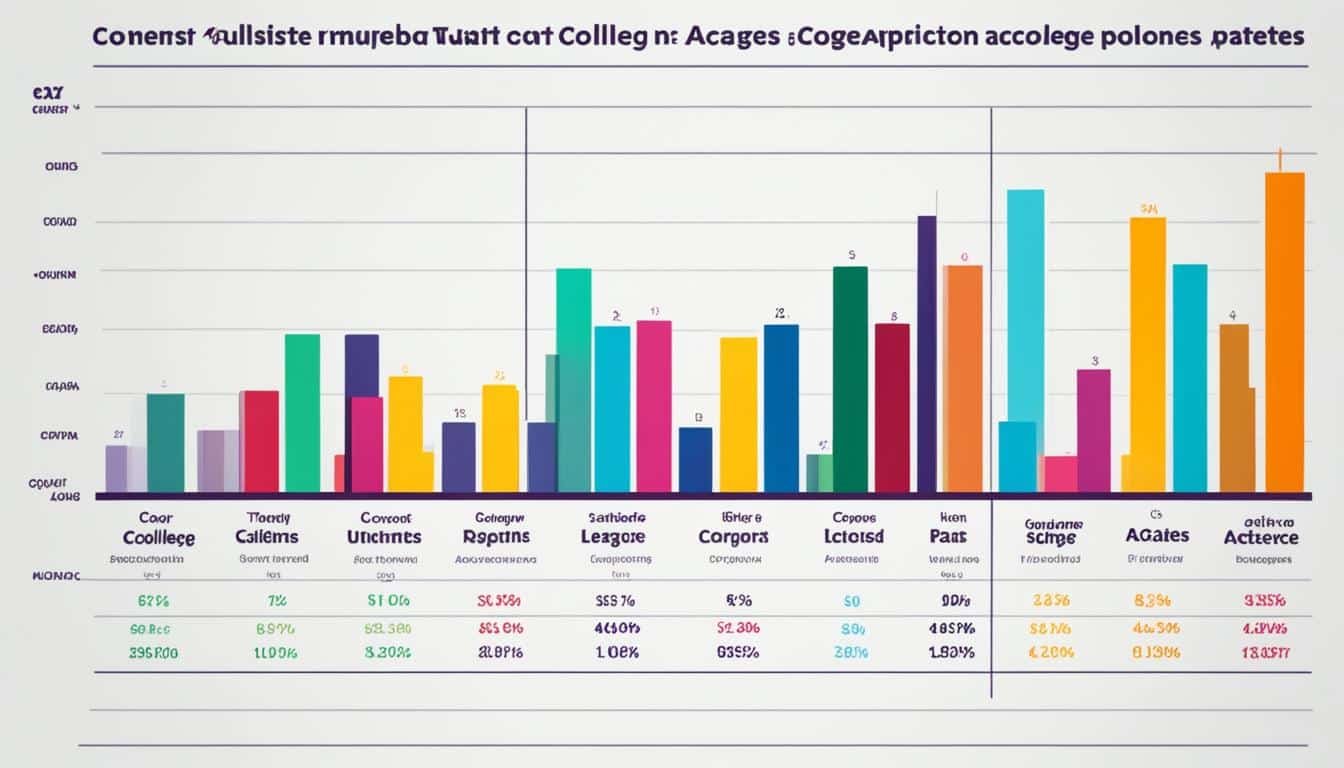Starting the university admissions process is both thrilling and a bit scary for students. It’s key to know what colleges look for when they review applications. They check your grades, how you spend your time outside class, your test scores, and other documents. Knowing these things helps you prepare your application better. This can make you more likely to get into your top choice school.
Key Takeaways
- Colleges look at your grades, activities outside class, and test scores.
- A good application essay shows who you are and why you’re a good fit.
- Recommendations from teachers or mentors highlight your character and potential.
- Knowing when and where to send your application is key to meeting deadlines.
- Each university has different acceptance rates and requirements, so do your homework.
Understanding Core College Requirements
Getting into top universities is tough, so knowing what colleges want is key. They look at your grades, activities outside class, and your essay. These parts are vital for getting noticed.
Standard Core Curriculum
Colleges really care about your grades in key subjects like math, science, English, and history. They check your grades, courses, and curriculum difficulty. Doing well in advanced coursework, like AP classes, can really help your application.
Extracurriculars
It’s not just about your grades. Extracurricular activities show you’re well-rounded. Colleges like to see you’re active in your school and local community, maybe even in leadership positions. These activities highlight your unique interests, skills, and contributions to the community.
Application Essay
The application essay lets you share your individual story and how you’ll fit in at the university. It’s your chance to stand out and show who you are.
“Colleges are looking for students who have not only excelled academically, but have also demonstrated a passion for learning and a commitment to their communities.”
Importance of Standardized Test Scores

Even though some colleges don’t require test scores, standardized test scores like the SAT and ACT are still key in college admissions. They help decide where students will start and if they get merit-aid. This makes them very important for students wanting to get noticed.
For students wanting to go to top colleges, good standardized test scores are a big plus. These scores give colleges a way to see how well you can do academically. They work with your personal statement and extracurricular activities to show who you are.
If you’re not sure about sending your test scores, talk to your school counselor or the colleges you’re applying to. They know what each college needs and can help you make the best choice for your goals.
| Standardized Test | Purpose |
|---|---|
| SAT | Assess critical thinking, problem-solving, and academic readiness for college |
| ACT | Measure academic achievement in English, mathematics, reading, and science |
The role of standardized test scores in getting into college changes with each school. So, it’s important to know what each college wants. By understanding this and showing off your best grades, you can boost your chances of getting into your top schools and getting merit aid.
“Strong test scores can help applicants stand out, especially at more selective institutions.”
Letters of Recommendation

Letters of recommendation are not always needed but can be very helpful. They give admissions counselors a peek into an applicant’s character, skills, and potential. These letters often come from a teacher or counselor who knows the applicant well.
When picking who to ask for a letter, choose people who know your strengths. A good letter can show admissions officers more about you than just your grades. It can highlight your activities, leadership, and personal qualities.
Letters of recommendation help admissions committees understand an applicant’s personality and work ethic. They look at more than just grades and test scores. These letters are key in making a well-rounded view of the applicant.
“A strong letter of recommendation can make a significant difference in a student’s college application, showcasing their unique talents and potential in a way that transcends their grades.”
University Admissions Deadlines
It’s key to keep up with college application deadlines. Missing them can hurt your chances of getting in. Most colleges have deadlines like early action, early decision, and regular decision. Make sure to check the deadlines for the schools you want to attend and send in your materials early.
Application Platforms
There are two main ways to apply to college – the Common Application and the Coalition Application. These platforms let students apply to many schools with one application. Always check which platform your colleges use.
- Common Application
- Coalition Application
Knowing the different application deadlines and the application platforms helps you apply smoothly and successfully.
“Don’t wait until the last minute to submit your college applications. Give yourself plenty of time to complete all the required materials.”
How College Acceptance Rates Work

College acceptance rates are key for students in the competitive world of higher education. They show the ratio of applicants to admitted students. This helps students understand their chances of getting in.
In recent years, many colleges, especially the Ivy League, have seen more applicants. This has made acceptance rates drop. More students are competing for fewer spots.
Public colleges usually have higher acceptance rates than private ones. They can take in more students because they are bigger.
When picking colleges, it’s smart to mix reach, match, and safety schools. Reach schools are very competitive and might be a stretch for you. Match schools are a good fit for your grades. Safety schools are where you’re likely to get in easily because your grades are higher than theirs.
“The college admissions process is a complex dance, and understanding acceptance rates is just one step in navigating it successfully.”
Knowing about college acceptance rates helps students make better choices. It boosts their chances of getting into their top-choice schools.
Admission Yield vs Enrollment Rate
The admission yield is key for universities. It shows how many students who get in actually go to the school. This rate changes a lot from one school to another. For example, Yale University has a much higher yield rate than the University of California, Berkeley.
More students apply to many colleges now, so fewer accept offers. This makes the admission yield go down. Knowing the difference between admission yield and enrollment rate helps students understand their chances of getting in and staying in their top choice school.
| University | Admission Yield | Enrollment Rate |
|---|---|---|
| Yale University | 70% | 99% |
| University of California, Berkeley | 35% | 92% |
The table shows how Yale University and the University of California, Berkeley compare in admission yield and enrollment rates. Yale’s high yield shows it’s very selective. UC Berkeley’s lower yield means students might have more choices and are less likely to attend after being accepted.
“Understanding admission yield and enrollment rate can provide valuable insights into a university’s popularity and the competitiveness of its admissions process.”
Looking at these metrics helps students make better choices in their college search. It’s all about understanding their options.
Latest College Acceptance Rate Statistics

College admissions have become more competitive lately. There’s been a big jump in applications to both public and private schools. The Common Application saw a 24% rise in applicants for public colleges and universities from the 2019-20 year. Private schools saw a 17% increase.
This has made it harder to get into many selective colleges and universities. For instance, Emory University, a top private school, saw its acceptance rate fall by 8 points from 2020 to 2022.
To get noticed, students need to have great grades, be active in extracurricular activities, write strong essays, get good recommendations, and score well on tests. But, getting into the most competitive colleges and universities is still not a sure thing.
| Institution | Acceptance Rate (2020) | Acceptance Rate (2022) | Percentage Point Change |
|---|---|---|---|
| Emory University | 16.5% | 8.7% | -7.8 percentage points |
| University of California, Los Angeles (UCLA) | 14.1% | 11.4% | -2.7 percentage points |
| University of Michigan | 23.9% | 20.1% | -3.8 percentage points |
“The increasing competition in college admissions underscores the importance of a well-rounded, exceptional application that showcases a student’s academic achievements, extracurricular involvement, and personal qualities.”
Entry Requirements for US Universities

Getting into US universities requires careful planning. You need to know the academic and language skills needed for both undergrad and graduate programs. This knowledge is key for a successful application.
Academic Requirements
For undergrad programs, you must have a high school diploma or an equivalent. Most colleges also want a minimum GPA, usually between 2.5 and 3.5. You’ll also need to do well on tests like the SAT or ACT, as each college has its own score goals.
Grad school is tougher. You need a bachelor’s degree and a GPA of at least 3.0. Some programs also want specific courses or work experience.
English Language Proficiency
If you’re from another country, you must show you can speak English. You can do this with tests like the TOEFL, IELTS, Pearson PTE, or Duolingo English Test. Colleges have set scores to make sure you can keep up with classes.
But, some colleges might not need these tests if you’re from an English-speaking country or have already studied in English. Always check the specific requirements for the colleges and programs you want to apply to.
Knowing what US universities look for in terms of academics and English skills helps you prepare. This way, you can boost your chances of getting into your top choice program.
Application Materials Needed
Applying to a university in the United States requires a lot of documents. These documents help the admissions team check if you’re a good fit for the school. They look at your grades, English skills, and more.
Here are the main things you’ll need:
- Academic Transcripts: You must send official transcripts from all schools you’ve attended. Make sure they’re in English if they’re not already.
- Proof of English Proficiency: If you’re from another country, you’ll need to show you know English. This can be through TOEFL or IELTS scores, or a degree from an English-speaking school.
- Personal Statement: Your personal statement lets you share your story, goals, and why you want to study in the US.
- Curriculum Vitae (CV) or Resume: You might need to send a detailed CV or resume. This should list your school wins, extra activities, and any jobs or volunteer work.
- Passport: You’ll also need to send a copy of your passport.
- Financial Documentation: You must show you can pay for school and living costs in the US.
It’s important to check each university’s specific requirements. This way, you can make sure you have everything you need. Getting all your documents ready can help you get into your dream university.
University Admissions
The process of getting into university looks at more than just grades and test scores. It uses a holistic approach. Colleges want to see your personal essay, letters of recommendation, and extracurricular activities too. This helps them understand you better.
If you don’t meet the grades or English skills needed right away, some universities offer prep programs. These programs help you get ready for your degree. Knowing what the application process and requirements are can really help you get into your dream university.
Universities review everything about you during the admissions process. They look at your grades, test scores, essay, letters of recommendation, CV or resume, and activities outside class. This way, they get a full picture of who you are and what you can do.
Knowing what universities want can help you prepare better. Make sure you meet the academic and English standards. Also, make your application stand out by showing your unique strengths and experiences.
Also Read : 10 Top University In The World
Conclusion
The university admissions process can feel overwhelming. But, by understanding the core requirements and latest trends, students can feel more confident. They need to keep up a strong academic record and join in extracurricular activities.
Writing a compelling application essay and getting letters of recommendation is also key. Each part of the application is important for the admissions decision.
Standardized tests like the SAT or ACT are still very important. Students must also meet specific entry requirements, including English language proficiency. Knowing about application deadlines and platforms is crucial too. And, keeping up with college acceptance rates can help students plan better.
The university admissions process is complex and requires careful planning and dedication. By staying informed and proactive, students can increase their chances of getting in. This way, they can start the next chapter of their education journey successfully.
FAQs
Q: What are the general requirements for university admissions?
A: To apply for university admissions, you should complete the application process, submit required documents, and pay any associated fees. Additionally, you may need to provide your academic transcripts, letters of recommendation, and standardized test scores.
Q: How can I get started with the university admissions process?
A: To get started with the university admissions process, you can visit the university’s website to learn about their requirements and deadlines. You can also contact the admissions office for guidance on how to proceed.
Q: Can I transfer credits from a community college to a university?
A: Yes, you can transfer credits from a community college to a university. However, the specific credit transfer policies may vary between institutions, so it’s best to contact the admissions office at the university you are interested in for more information.
Q: What is the best way to become a student at a university?
A: The best way to become a student at a university is to complete the application process, meet all the necessary requirements, and submit all required documents by the specified deadlines. It’s also important to pay attention to any additional instructions provided by the admissions office.
Q: How can I request financial aid for my college or university education?
A: To request financial aid for your college or university education, you can fill out the Free Application for Federal Student Aid (FAFSA) form online. This form will help determine your eligibility for various types of financial aid, including grants, loans, and scholarships.
Q: What should I do if I want to visit the campus before applying?
A: If you want to visit the campus before applying, you can contact the admissions office to schedule a campus tour or attend an open house event. Visiting the campus can help you get a better sense of the university’s environment and facilities.
Q: How can I register for classes as a new student?
A: To register for classes as a new student, you will need to follow the instructions provided by the university’s registrar’s office. Typically, you will need to log in to the student portal, select your courses, and confirm your registration before the semester begins.
